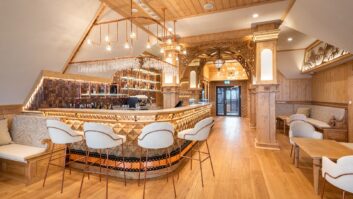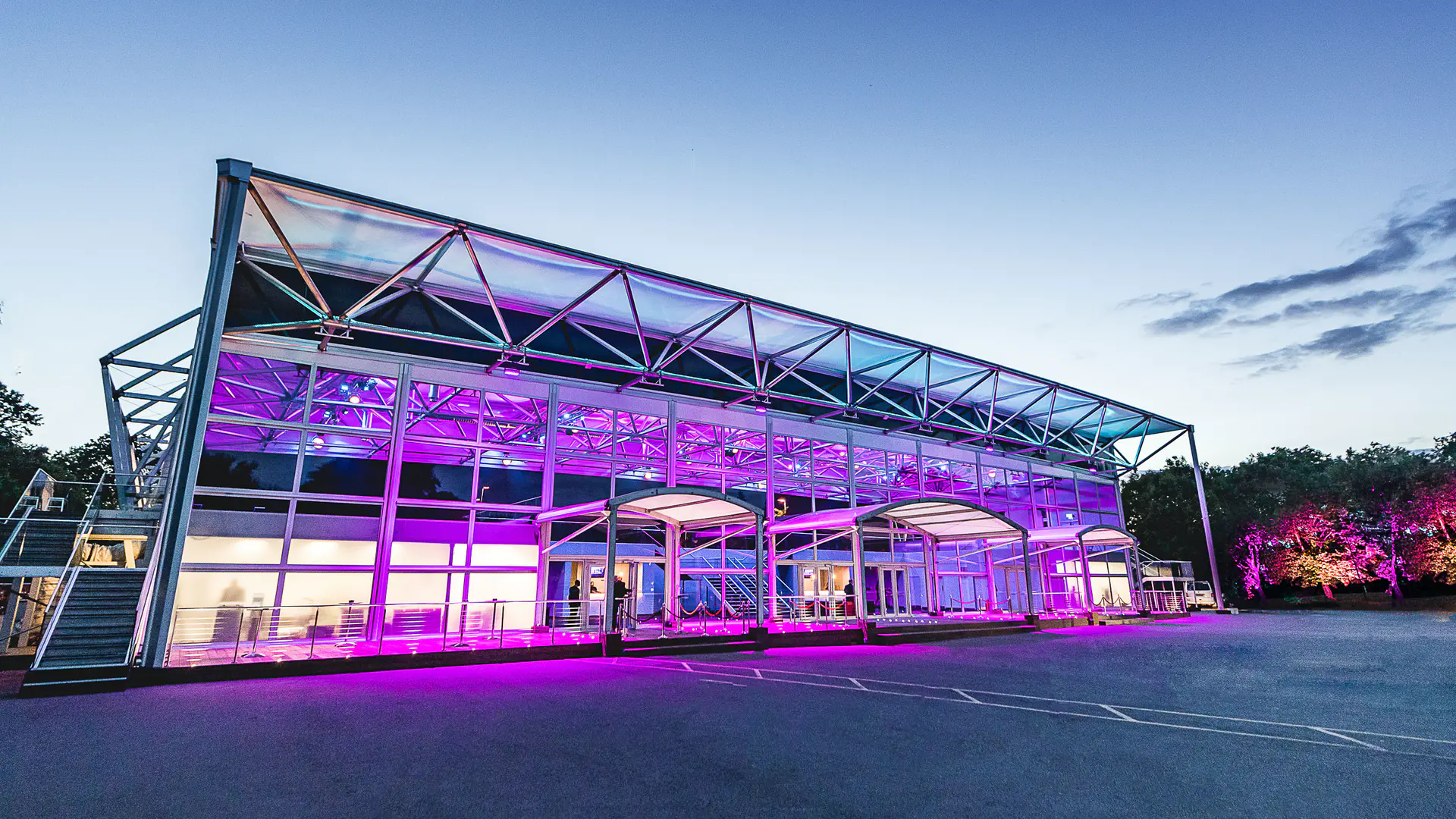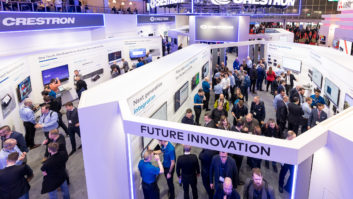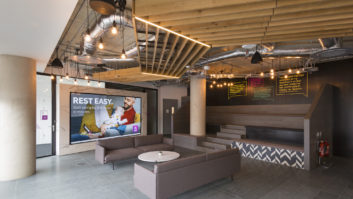
Joe Rabah, managing director EMEA at RMG Networks looks at the ways the hospitality sector is incorporating technology further into the customer offering and highlights the tech that gives hospitality providers with the best chance of standing out from the crowd.
The times they are a-changing for hospitality. A couple of years ago, industry commentators highlighted the inexorable rise of Airbnb, warning with strategic vision it could become serious competition for traditional hospitality — and so it has come to pass. Airbnb has signalled its intention to move into (extremely) luxury accommodation with the accompanying risk that the clientele that it first attracted as penniless students, but which is maturing into increasing wealth will follow it.
Meanwhile, the proliferation of technology and the Internet of Things is really changing the rules of the hospitality game: brands such as Marriot and Hilton are set to launch specifically tech-focused rooms this year, with smart speakers that can adjust room temperatures and order hotel services from verbal instructions being just some of the options available. Many guests are likely to prefer this, for reasons rooted in privacy, convenience and entertainment, thus the fully-connected hotel stay is set to take over from traditional provision. It’s not only in the hotel sector that this shift to incorporating technology further into the customer offering is evident though. Technology is also being used to great effect in the restaurant, entertainment and leisure venues within the hospitality sector as a whole. From providing personalised customer experiences to ensuring stock levels are maintained and route-finding visitors through their journey to name a few.
One clear and fundamental message has emerged from the recent disruption of the sector though; if hospitality brands are to stay relevant and able to compete they must offer not just great hospitality, but hospitality as an experience.
This may sound daunting, particularly to smaller businesses, but in fact it offers a wealth of opportunity. With some thought, innovation and careful deployment of technology, hospitality providers — even the smallest — can find almost limitless means by which to stand out from the crowd. Here are some of the best.
Augmented Reality
While virtual reality, or VR, has yet to take off in a big way for hotels (although experiments are ongoing), its close relative AR is proving a real game-changer. With AR, digital information is presented in immersive forms within the environment, so rather than presenting an entirely new and often fictional context (as in VR) it simply enhances and deepens what the customer is already experiencing — it quite literally, and perceptibly, adds value.
In a world that has increasingly high expectations of both brands and technology, there are many ways to use AR to win customers’ attention and loyalty, including smartphone apps that ‘see’ the hotel through the phone camera and overlay information and hyperlinks accordingly and app-based guided tours of the hotel. Wearables such as special AR-enabled glasses furthermore reinforce the trend and the possibility of AR soon becoming part of everyday life. There is something to suit most price points and they can make a real difference to the customer’s experience.
One particular way in which the hotel sector is achieving the enhancing of the customer experience is by utilising wayfinding. It provides visual cues, and wayfinding apps can feed into mapped out prompts, such as landmarks or signs, taking the stress out of navigation. Through an immersive AR Wayfinding app, the hotel can ensure its guests can easily navigate their way through the city they are in, as well as within the hotel building itself.
Artificial Intelligence
Like AR, AI comes in many forms and can transform the client journey drastically. The companies making the very best use of AI tend to be those providing genuinely omni-channel services, whereby their AI devices ‘learn’ from information about each customer gleaned from various channels at different times. So, for example, a customer who books a hotel stay via their online account can be greeted by name when a virtual receptionist installed in the hotel reception ‘recognises’ them. Interactive bot concierges, such as Rose of the Cosmopolitan in Las Vegas, is one example of this which is becoming more widely used.
Alternatively, information collected from various streams such as online, telephone contact or previous visits, can be used to provide a genuinely customised experience for each client, such as trip or dining suggestions on the hotel app or on a screen in the client’s room. AI has the advantage of being able to learn from big data and access the very latest information instantly, which can also enhance a guest’s visiting experience. Traffic updates can be communicated as they happen, or if the weather is particularly bad, AI can suggest alternative activities or trips which are suitable.
Radio-Frequency ID (RFID) and NFC (Near Field Communication) technology
The use of RFID keys and wristbands is proving hugely popular with hotels and clients alike, largely because they can greatly streamline the hospitality process and offer many benefits to both parties. For guests, RFID keys or bracelets can be programmed to allow swift and easy access to all relevant parts of the hotel, with none of the fuss of fumbling for keys or cards. For hotels, this can mean better security and more straightforward administration. An increasing number of hospitality venues also use RFID keys as payment cards, which makes life easier for guests and allows hotels to track and monitor stock with great precision.
Looking ahead, it seems likely that wristbands and smart keys will progress to include functions additional to RFID, such as access to tailored offers, AR/VR options and so forth. Likewise, NFC offers brands the opportunity to link electronic devices to one another – for example linking mobile phones with interactive digital signage displays, creating opportunities to personalise content and improve the customer journey.
Modular LED Technology
Digital signage is continually evolving and offering more than the traditional static message boards that consumers have previously been accustomed to. Digital signage has a crucial role to play in revolutionising a guest’s experience – with the ability to instantly transform any space or environment.
The ways in which signage technology can be utilised to engage with guests is almost endless, with more and more options available than ever before – curved LED screens, flat panel displays and 4k ultra-HD screens, interactive floors and interactive displays controlled by remote body movement are just some of the choices available to the hospitality sector.
These new dynamic display technologies are extremely adaptable, versatile and flexible, fitting into any environment, complementing the surroundings and bringing the environment and messaging to life. For example, LED screens can be placed indoors and outdoors, to be curved or built to a particular size-grabbing attention and deliver messages with impact and vibrancy. Holograms can create interest and deliver imagery and messaging subtly without changing the surrounding landscape.
Mobile phones
The role that mobile phones have to play for hotels is indeed huge – the devices already, and will continue to, play a vitally important role for the hotel sector. They have all but become the communications tool of choice for consumers within all sectors, not just the hospitality market, so it is crucial the sector recognises this and utilises mobile phone friendly communications as best and widely as possible.
Mobile phones have the distinct ability to combine all communications seamlessly, from the business to the consumer, and therefore have become arguably the most valuable tool for the hospitality sector.
A content management system (CMS) that brings it all together
For many of the devices described above there are areas of crossover; for example, it is entirely possible to combine AI with AR/RFID/NFC to automate check-in and check-out as well as payment, taxi bookings, requests for extra room linen, etc. However, all of these possibilities rely on data.
More precisely, they rely on frequently updated, effectively curated and presented, and accurate data. In hospitality, new data is being generated all the time — every time a client expresses a preference, books a service, considers a destination, all of these are opportunities for hospitality brands to tailor their offerings and place themselves above the opposition in customers’ eyes. But for that data to be useful, it has to be contextualised, analysed and presented where it is needed in an easily digestible manner.
That is why a highly effective CMS should lie at the heart of every hospitality business. The very best hospitality CMS will inform both employees and consumers alike providing data-driven insights, relevant information and content to create aspirational, superior customer engagement. Going one step further, a great CMS has the ability to power up immersive hospitality applications bound to make a lasting impact on visitors and clients.







